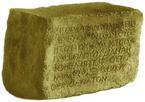Jesus' interactions with people in the Gospel of John...and today
 This is the second part of a series that looks at events in the Gospel of John in which we find Jesus interacting with various people who need help‚ÄĒphysical help and spiritual help. As we look closely at these individuals, we will often see that they are dealing with shame, though this theme is usually hidden in the historical background of the first century. Thus, over the course of this series, we will explore how Jesus interacts with them not only to take away their shame, but also to raise them up and give them honor!
This is the second part of a series that looks at events in the Gospel of John in which we find Jesus interacting with various people who need help‚ÄĒphysical help and spiritual help. As we look closely at these individuals, we will often see that they are dealing with shame, though this theme is usually hidden in the historical background of the first century. Thus, over the course of this series, we will explore how Jesus interacts with them not only to take away their shame, but also to raise them up and give them honor!
In John 2:13-22, Jesus clears the temple courts of animals and moneychangers. This passage is often misunderstood as a text where Jesus displays his anger over the financial greed which was taking place in the temple, based on the quote, ‚ÄúStop turning my Father‚Äôs house into a market!‚ÄĚ (John 2:16). While certainly Jesus was concerned about greed, there is much more behind the scenes.
 The sale of animals and exchange of money occurred somewhere in the large outer courts of the temple, in the so-called Court of the Gentiles. Gentiles could get no closer to the Holy of Holies than this outer courtyard. Only Jews could enter the inner courtyard areas. In fact, archeologists have found a large stone that served to warn Gentiles from getting any closer to the inner courts than the outer Court of Gentiles. Its inscription reads: ‚ÄúNo foreigner is to go beyond the balustrade and the plaza of the temple zone. Whoever is caught doing so will have himself to blame for his death which will follow.‚ÄĚ
The sale of animals and exchange of money occurred somewhere in the large outer courts of the temple, in the so-called Court of the Gentiles. Gentiles could get no closer to the Holy of Holies than this outer courtyard. Only Jews could enter the inner courtyard areas. In fact, archeologists have found a large stone that served to warn Gentiles from getting any closer to the inner courts than the outer Court of Gentiles. Its inscription reads: ‚ÄúNo foreigner is to go beyond the balustrade and the plaza of the temple zone. Whoever is caught doing so will have himself to blame for his death which will follow.‚ÄĚ
It was Herod the Great who around 19BC began to rebuild and greatly expand the size of the temple. It was Herod who also installed various courtyards within the temple area, including courts for priests, Israelites, women, and Gentiles.
When Solomon first built the temple, however, there were not distinct areas for Jews and Gentiles, though there were areas that were seen as more holy and restricted to priests. In fact, when Solomon dedicated the original temple, we see a surprising prayer for the foreigner/Gentile:
As for foreigners who do not belong to your people Israel but have come from a distant land because of your great name and your mighty hand and your outstretched arm‚ÄĒwhen they come and pray toward this temple, then hear from heaven, your dwelling place. Do whatever the foreigner asks of you, so that all the peoples of the earth may know your name and fear you, as do your own people Israel, and may know that this house I have built bears your Name.
2 Chronicles 6:32-33
Now let‚Äôs focus more clearly on the shame issue. When the Jewish people of Jesus‚Äô day were selling animals and exchanging money in the Court of the Gentiles, they were in essence declaring the Gentiles to be second-class citizens, foreigners, excluded, outsiders. While it is true that they were ‚Äúforeigners to the covenant‚ÄĚ (Eph 2:12) between God and Israel, it is obvious that the original intent of the temple was to invite foreigners to come and pray. It was Solomon‚Äôs prayerful hope that God would answer their prayers, resulting in these foreigners coming to know God as the true God. In this way, the ‚Äúoutsider‚ÄĚ could become an ‚Äúinsider.‚ÄĚ
How difficult, though, it would have been for the Gentiles to pray in the environment found in the Court of the Gentiles, surrounded by the sounds…and smells…of animals, of the hustle and bustle of sellers trying to get a good price, of money changers clinging their coins. It would be a mixture of trying to worship in a bank and a barn all at the same time. Impossible!
How shamed they must have felt as they stepped around‚Ķand in‚Ķthe remnants of cattle and sheep. It was a constant reminder that they did not belong. Despite Solomon‚Äôs prayer, I‚Äôm sure the Gentiles asked themselves a time or two, ‚ÄúIs this really the house of the true God? Does this God even care about us? Do these dirty animals and smelly conditions mean that God is not concerned about me and my prayers?‚ÄĚ
Jesus, though, saves the day. He ‚Äúdrove all from the temple courts, both sheep and cattle; he scattered the coins of the money changers and overturned their tables‚ÄĚ (2:15). While it is clear that this cleansing of the temple is also a judgment of Israel for excluding the foreigner (see Jeremiah 7:11; Zech 14:21), it also creates a sacred space for the Gentiles‚ÄĒa place where they‚Ķtoo‚Ķcan come to the temple and pray to the true God. Isaiah 56:7, quoted by Jesus in the temple cleansing in Mark 11:17, hits the nail on the head: ‚Äúmy house will be called a house of prayer for all ≤‘≤Ļ≥ŔĺĪī«≤‘≤ű.‚ÄĚ All nations! Yes, God does care for the outsiders.
Just as he saved the Gentiles from a shameful situation in the first century, he does the same today. There are many who feel like they are excluded‚ÄĒoutside of God‚Äôs care and concern. ‚ÄúCertainly God could not care for little ‚Äėole me‚ÄĚ is their motto. I see this in the students with whom I talk all the time. A female student was harboring bitterness and anger towards other women because another woman had stolen her boyfriend. She knew that this anger was wrong, but could not let it go. As time went on, she also began to feel that she was an outsider to God because of her sin. She was sure that God would not accept her. She finally decided to approach God about it in prayer. As she described her prayer time to me, it was clear that she initially did not feel comfortable approaching the ‚Äúthrone of grace‚ÄĚ‚ÄĒher sin and shame immobilized her. She later wrote what she ‚Äúsaw‚ÄĚ as she prayed through this issue.
I knew He wanted me to approach Him, but I was scared to because of who He was and because of who I know I am. Finally, after realizing that he wanted me to come over to Him, and that it was with the love of a Father that He wanted to talk to me, I slowly made my way over. When I reached Him, He pulled me into a hug, and it felt as if He had been eagerly awaiting my arrival.
It was then that I realized I had been carrying a large backpack that was weighing on my shoulders, and making it difficult to walk far. I took off the backpack and held on to it. The weight of it stunned me because I hadn't realized that I was carrying around something that heavy. I confessed everything that I had done wrong and placed it inside the backpack. I then asked Him if He would take the backpack from me. He said of course He would and took the backpack from me. It was not heavy for Him to carry like it was for me. He put the backpack on His back and walked to the edge of the cliff. He then tossed the backpack out into the ocean.
A couple of months later she reflected on this experience:
I have run into a few of the girls that used to affect me so much before, and I actually had conversations with them, not feeling any negativity towards them at all. I don't feel the weight of guilt and shame on my shoulders like I did before. I do realize what I did was very wrong, but I have stopped beating myself up over it since I prayed. I see that Jesus took that shame and guilt upon his shoulders (or upon His back as I saw in my prayer), and I no longer have to die for my sin because He already did that.
She was transformed from a frightened ‚Äúforeigner‚ÄĚ to a welcomed, forgiven, and honored child of the King. The good news is that our Lord loves to rescue those who feel the shame of being an outsider and gives them praise and honor in his glorious presence. He carried our sins on his back! He is always pursuing and welcoming so-called ‚Äúforeigners‚ÄĚ in order to transform them into family.
 51¬‹ņÚ
51¬‹ņÚ
.jpg)


.jpg)